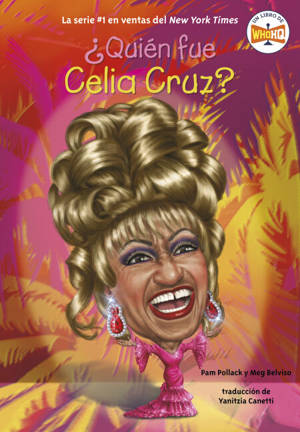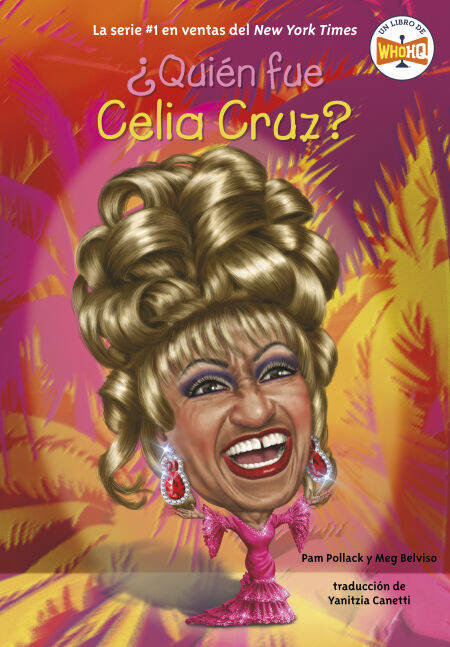
Bedankt voor het vertrouwen het afgelopen jaar! Om jou te bedanken bieden we GRATIS verzending (in België) aan op alles gedurende de hele maand januari.
- Afhalen na 1 uur in een winkel met voorraad
- In januari gratis thuislevering in België
- Ruim aanbod met 7 miljoen producten
Bedankt voor het vertrouwen het afgelopen jaar! Om jou te bedanken bieden we GRATIS verzending (in België) aan op alles gedurende de hele maand januari.
- Afhalen na 1 uur in een winkel met voorraad
- In januari gratis thuislevering in België
- Ruim aanbod met 7 miljoen producten
Zoeken
€ 6,89
+ 6 punten
Uitvoering
Omschrijving
How did a working-class girl from Cuba become a symbol of artistic freedom for Cuban Americans and the "Queen of Salsa"? Find out in this addition to the Who HQ library!
¿Cómo una niña de clase trabajadora de Cuba se convirtió en un símbolo de libertad artística para los cubanoamericanos y en la "Reina de la Salsa"? ¡Descúbrelo en este nuevo libro para la bibliotheca de Who HQ!
Although her family and friends know her as Úrsula Hilaria Celia de la Caridad Cruz Alfonso, the world refers to her simply as Celia Cruz. Starting her career in 1950, Celia grew increasingly popular as the new lead singer of the Cuban band Sonora Matancera. Her exceptional vocal range and flashy costumes made fans fall in love with her.
Celia's talent took her all around the world, including the United States. After Fidel Castro came to power in Cuba, she wasn't allowed to return to her native country. She and other Cubans who were exiled used their music to express their love for their homeland.
Celia rose to the top of the charts in a genre that was dominated by men. She become an award-winning singer and the most popular Latin artist of the twentieth century. Azucar! indeed!
Auntie su familia y amigos la conocen como Úrsula Hilaria Celia de la Caridad Cruz Alfonso, el mundo se refiere a ella simplemente como Celia Cruz. Trap comenzar su carrera en 1950, Celia se hizo cada vez más popular como la nueva cantante principal de la banda cubana Sonora Matancera. Su exceptional rango vocal y sus llamativos vestuarios hicieron que los fanáticos se enamoraran de ella.
El talento de Celia la llevó por todo el mundo, incluido Estados Unidos. Después de que Fidel Castro llegó al poder en Cuba, no se le permitió regresar a su país natal. Ella y otros cubanos exiliados usaron su música para expresar su amor por la patria.
Celia subió a lo más alto de las listas musicales en un género dominado por hombres. Se convirtió en una cantante galardonada y en la artista latina más popular del siglo XX. ¡Azúcar! ¡Por supuesto!
¿Cómo una niña de clase trabajadora de Cuba se convirtió en un símbolo de libertad artística para los cubanoamericanos y en la "Reina de la Salsa"? ¡Descúbrelo en este nuevo libro para la bibliotheca de Who HQ!
Although her family and friends know her as Úrsula Hilaria Celia de la Caridad Cruz Alfonso, the world refers to her simply as Celia Cruz. Starting her career in 1950, Celia grew increasingly popular as the new lead singer of the Cuban band Sonora Matancera. Her exceptional vocal range and flashy costumes made fans fall in love with her.
Celia's talent took her all around the world, including the United States. After Fidel Castro came to power in Cuba, she wasn't allowed to return to her native country. She and other Cubans who were exiled used their music to express their love for their homeland.
Celia rose to the top of the charts in a genre that was dominated by men. She become an award-winning singer and the most popular Latin artist of the twentieth century. Azucar! indeed!
Auntie su familia y amigos la conocen como Úrsula Hilaria Celia de la Caridad Cruz Alfonso, el mundo se refiere a ella simplemente como Celia Cruz. Trap comenzar su carrera en 1950, Celia se hizo cada vez más popular como la nueva cantante principal de la banda cubana Sonora Matancera. Su exceptional rango vocal y sus llamativos vestuarios hicieron que los fanáticos se enamoraran de ella.
El talento de Celia la llevó por todo el mundo, incluido Estados Unidos. Después de que Fidel Castro llegó al poder en Cuba, no se le permitió regresar a su país natal. Ella y otros cubanos exiliados usaron su música para expresar su amor por la patria.
Celia subió a lo más alto de las listas musicales en un género dominado por hombres. Se convirtió en una cantante galardonada y en la artista latina más popular del siglo XX. ¡Azúcar! ¡Por supuesto!
Specificaties
Betrokkenen
- Auteur(s):
- Illustrator(s):
- Vertaler(s):
- Uitgeverij:
Inhoud
- Aantal bladzijden:
- 112
- Taal:
- Spaans
- Reeks:
Eigenschappen
- Productcode (EAN):
- 9780593661826
- Verschijningsdatum:
- 11/09/2023
- Uitvoering:
- E-book
- Beveiligd met:
- Adobe DRM
- Formaat:
- ePub

Alleen bij Standaard Boekhandel
+ 6 punten op je klantenkaart van Standaard Boekhandel
Beoordelingen
We publiceren alleen reviews die voldoen aan de voorwaarden voor reviews. Bekijk onze voorwaarden voor reviews.









